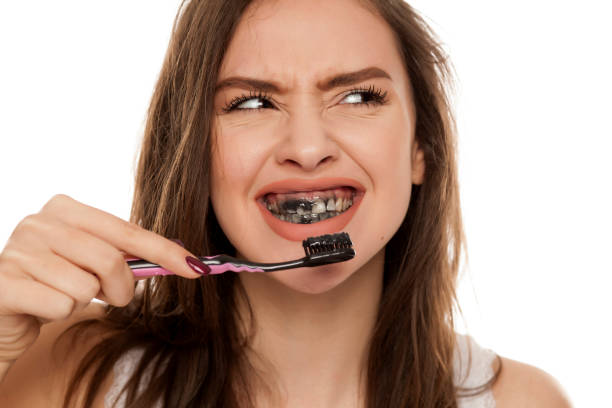Charcoal toothpaste has become more popular lately, with well-known brands like Colgate, Crest, Hello and Burt’s Bees entering the charcoal toothpaste market.
Is this trend worth the try? Is it a good idea to use charcoal toothpaste during Cool Braces treatment with Dr. Tahir?
Our team is here to help you make the best decisions for your smile! Here’s everything you need to know:
What is charcoal toothpaste?
Charcoal toothpaste uses activated charcoal, which is a fine-grain powder made from wood, coconut shells, and other natural substances. Activated charcoal is highly absorbent, acting like a sponge, to pull out toxins and lift stains from the enamel (the surface layer of the teeth).
Is charcoal bad for your teeth?
Charcoal is mildly abrasive, and over time, it can wear down your enamel. Brushing your teeth with activated charcoal is a slippery slope. While charcoal toothpaste may remove surface stains in the short run, it can cause your teeth to yellow over time and become more sensitive as it damages your enamel.
Charcoal damages enamel.
Your enamel has the critical responsibility of protecting the sensitive inner layers of your teeth. It protects your teeth from damage due to chewing, biting and grinding teeth. Enamel does not grow back. Once it’s gone, it’s gone. Preserving your enamel by avoiding abrasive materials and minimizing contact with sugary acids is key.
The American Dental Association (ADA) does not currently approve of any toothpastes with activated charcoal.
Due to charcoal’s abrasiveness, the importance of preserving enamel, and the ADA not approving charcoal toothpaste, charcoal is not the best ingredient to use on your teeth – whether you have braces or not.
Charcoal toothpaste and braces
Your braces are very strong and durable. However, charcoal can get stuck within brackets and wires, leaving black specks behind.
Plus, brushing aggressively can loosen a bracket, wire or elastic. Adding abrasive charcoal toothpaste to the mix can add even more pressure to your braces, increase the risk of them breaking, and lead to an orthodontic ‘emergency’.
Is a charcoal toothbrush safe?
A charcoal toothbrush is a toothbrush that has bristles infused with activated charcoal. These bristles are typically attached to a wooden/bamboo handle.
Charcoal bristles are believed to absorb bacteria and help prevent bad breath. However, like charcoal toothpaste, charcoal toothbrush bristles are abrasive and damaging to tooth enamel. Charcoal toothbrushes do not have the ADA’s seal of acceptance and therefore are not safe to use.
Is charcoal mouthwash safe?
Based on a study published in the National Library of Medicine, “There is insufficient evidence to substantiate the therapeutic and cosmetic marketing claims of charcoal-based mouthwashes, including antimicrobial activity, anti-halitosis, tooth whitening, periodontal disease control, caries reduction and tooth remineralisation, among others.”
In other words, there is not enough evidence to prove that charcoal-based mouthwashes provide any benefits for neither cosmetics nor health. Charcoal mouthwash is therefore unnecessary and potentially damaging to enamel.
Try a mouthwash that has been approved by the ADA instead!
Is charcoal floss safe?
Like charcoal toothpaste and charcoal mouthwash, using charcoal floss is a gamble. Charcoal particles can wear down enamel and make you more susceptible to tooth decay (cavities) and sensitivity. Use one of these flosses with the ADA seal of acceptance instead!
Can you use whitening toothpaste with braces?
One reason people may choose to use charcoal toothpaste is for the whitening benefits. We now know that charcoal toothpaste is not a good choice due to its abrasive properties. Does that mean you should try a different type of whitening toothpaste with braces?
Not necessarily. Your braces brackets are bonded to the front surfaces of teeth, which means the area under your brackets will not be accessible by your whitening treatment. When your braces are removed, you’ll have darker squares of discoloration where your brackets once were.
So, is whitening toothpaste bad for braces? Whitening toothpaste shouldn’t damage your braces, but it can leave discoloration behind with traditional braces.
However, if you have Cool Invisalign® clear aligners, you can undergo teeth whitening during treatment!
Still have questions about charcoal or black powder toothpaste?
Please don’t hesitate to reach out to us with any questions. We’re more than happy to discuss oral hygiene with you and help you choose the right toothpaste to ensure the best results from orthodontic treatment.
Ready to start your orthodontic journey and make yourself a magnet for life’s opportunities? Request your complimentary consultation with us at one of our orthodontist offices in Berwyn or Oak Lawn, IL.






